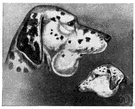mucoid
Also found in: Thesaurus, Medical, Encyclopedia, Wikipedia.
Related to mucoid: mucoid cyst
mu·coid
(myo͞o′koid′)n.
Any of various glycoproteins, especially a mucoprotein, similar to the mucins.
adj.
Of, relating to, or resembling mucus.
American Heritage® Dictionary of the English Language, Fifth Edition. Copyright © 2016 by Houghton Mifflin Harcourt Publishing Company. Published by Houghton Mifflin Harcourt Publishing Company. All rights reserved.
mucoid
(ˈmjuːkɔɪd) ormucoidal
adj
(Biochemistry) of the nature of or resembling mucin
Collins English Dictionary – Complete and Unabridged, 12th Edition 2014 © HarperCollins Publishers 1991, 1994, 1998, 2000, 2003, 2006, 2007, 2009, 2011, 2014
mu•coid
(ˈmyu kɔɪd)n.
1. any of a group of substances resembling the mucins, occurring in connective tissue, cysts, etc.
adj. 2. Also, mu•coi′dal. resembling mucus.
[1840–50]
Random House Kernerman Webster's College Dictionary, © 2010 K Dictionaries Ltd. Copyright 2005, 1997, 1991 by Random House, Inc. All rights reserved.
ThesaurusAntonymsRelated WordsSynonymsLegend:
Switch to new thesaurus
| Noun | 1. |  mucoid - any of several glycoproteins similar to mucin mucoid - any of several glycoproteins similar to mucinglycoprotein - a conjugated protein having a carbohydrate component |
| Adj. | 1. | mucoid - relating to or resembling mucus; "a mucoid substance" |
Based on WordNet 3.0, Farlex clipart collection. © 2003-2012 Princeton University, Farlex Inc.
Translations
mu·coid
n. mucoide, glucoproteína similar a la mucina;
a. de consistencia mucosa.
English-Spanish Medical Dictionary © Farlex 2012